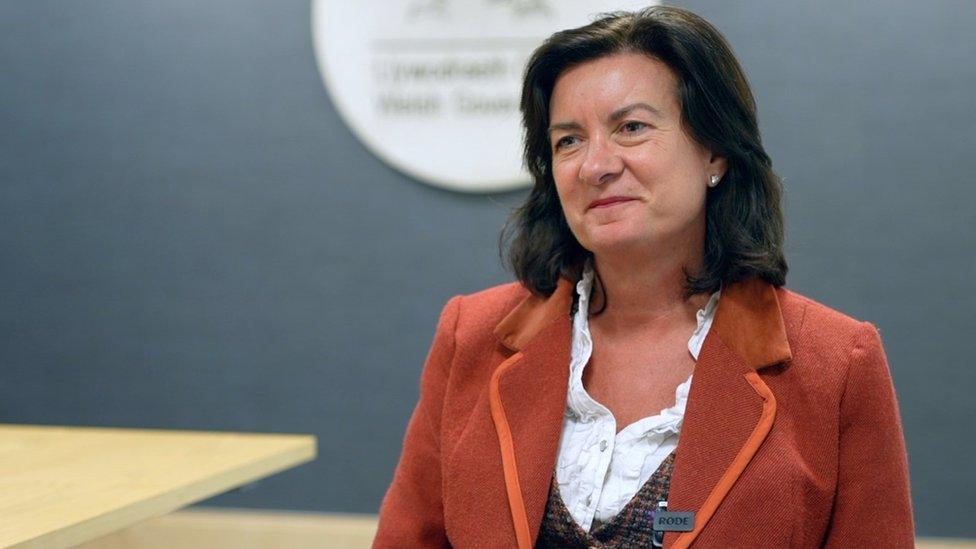Winter pressure may hit NHS Wales wait targets - minister
- Published
- comments

Ms Morgan has encouraged members of the public to help the NHS
Wales' health minister says she is hopeful winter pressures will not hit targets to bring down waiting lists.
However, Eluned Morgan said she would not guarantee that this year's winter pressures would not further jeopardise the targets.
The minister conceded that it would be "really tough and it does depend on what happens this winter".
The Welsh government has already missed two key targets on driving down waiting times.
There are currently about 52,000 outpatients waiting more than a year for a first appointment.
That is 48.7% down from the peak in August 2022, but the target was to eliminate that to zero by the end of the last calendar year, and the new target was for it to be eliminated by the end of this year.
However, for the past two months, that figure has been going up, not down.
Speaking on BBC Politics Wales, Ms Morgan said she was "hopeful" of reaching an interim target that 97% of people waiting more than two years will be treated by the end of this calendar year.
She added that this would depend on what happened this winter.
The Welsh government's focus is the longest waits - those people waiting more than two years for treatment.
There are currently 27,000 on that list, and although progress has been made, the Welsh government has again missed the target to eliminate that by March 2023, and its news target is to bring that down completely by March 2024.
But a report by the Senedd health and social care committee projected that at the current rate of progress, it would not be reached until September 2025, 18 months after the target.
Ms Morgan said "in order to drive the system further" interim targets have been introduced.

Over the past two months the number of patients waiting from treatment has increased
She conceded that there were difficulties in seeing patients in certain specialities, particularly orthopaedics, and therefore the next interim target was to bring down the list of those waiting more than two years by 97% by the end of next month.
Asked whether she would take political responsibility for the state of the NHS, she said she was "constantly taking responsibility".
She added that she took her fair share, but insisted that it was for others, including health boards and the public, to do the same.
"I do think that health boards have got to take the responsibility, because I delegate a lot of power and responsibility to health boards, and they need to step up and they need to make sure they deliver."
She added that it was up to individuals to take responsibility for their own health and for their families.
"I think the public need to take more responsibility, because it is not sustainable unless we all take a personal responsibility.
"I think we're going to have to take more responsibility for our elderly families, for example, my mother has Alzheimer's, and the whole family is coming together, stepping in and supporting."
Ms Morgan said with these kinds of health problems and an ageing population, she was not sure to what extent this could continue in the future.
Russell George, for the Welsh Conservatives, said: "The Labour minister has failed to make any significant progress in getting two-year waits down, by current levels it'll take years to eliminate them.
"Instead of making excuses now the minister needs to get into the detail of what's gone wrong and get waiting lists under control."

A POSITIVE LIFE: HIV from Terrence Higgins to today
ACID DREAM: The Welsh farmhouse that sparked a revolution of the mind

Related topics
- Published8 November 2023

- Published6 November 2023

- Published8 November 2023

- Published21 September 2023

- Published16 October 2023
